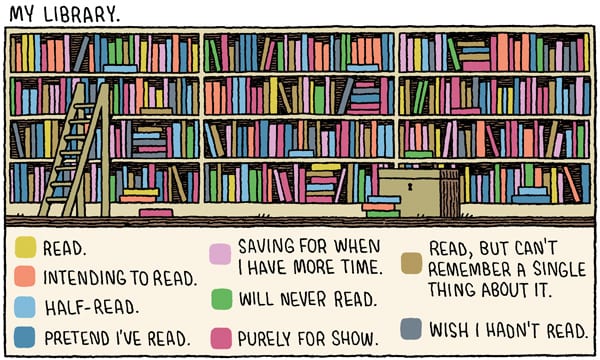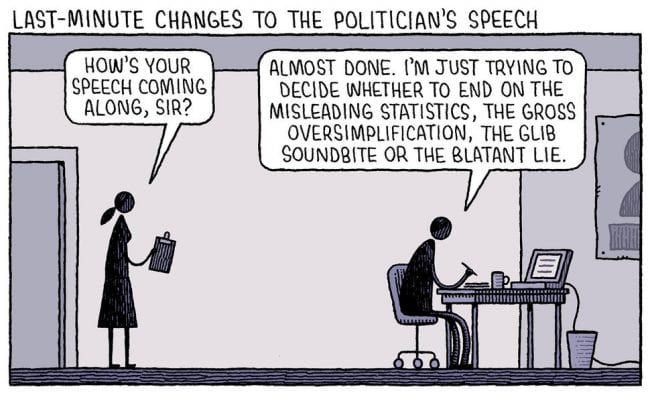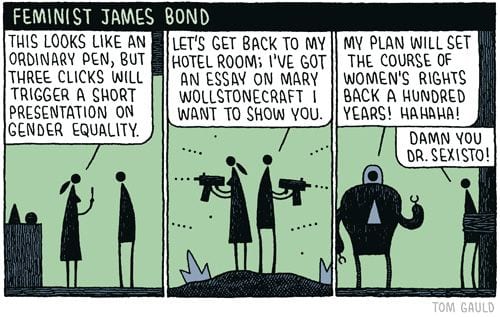Tom Gauld’s Baking With Kafka is a collection of weekly cartoon strips from The Guardian's books section, hilariously sending up the literary world, and finding the humor in things we take way too seriously. I spoke with Gauld about his influences growing up, the challenges and rewards of doing a weekly cartoon strip, and the person he'd most like to cast as James Bond.
Alex Wong: Growing up in Aberdeenshire, Scotland, who were your earliest comic book influences?
Tom Gauld: The first comics I read were Asterix and The Adventures of Tintin. They were the only comics my local library carried. There were loads of kids books, but they only had a complete run of those two series, and like two Lucky Luke comic books. My parents were big fans of the library, and we would go every week, so I was able to work my way through the complete runs of Asterix and The Adventures of Tintin.
What books and authors influenced you to write and do illustrations about literature?
I stumbled into it and never really saw myself as someone who would write. I always drew as a kid. I was always drawing. I loved comics partly because of the stories, but more from looking at the drawings and then copying the drawings. I went to college to study illustrations, and while I was there, I realized I didn’t want to illustrate other people’s stories. The fun was actually in telling stories with your own pictures. That wasn’t until I was in my early twenties. I never really thought about being a writer. I was reading Kurt Vonnegut and J.G. Ballard as a kid, but there was never any intention to be a writer myself.
Baking With Kafka has some wonderful commentary on the literary world. So, even though you didn’t plan on being a writer, did you start thinking about these ideas while you were reading growing up?
As a teenager, I didn’t read much high literary stuff. I was reading a lot of comic books and science fiction. My interest in the type of literary work that’s covered in these cartoons came when I was in college and later when I was working, that’s when I started reading more things that inspired these comics. I suppose I was late in developing an interest in the classics that I never read as a child, like some of Charles Dickens’s work. And maybe the fact I wasn’t forced to read any of that stuff while I was younger means I haven’t gotten sick of it the way some people have.
And you still haven’t gotten sick of it?
All of the cartoons in the book were done for The Guardian’s literature section and I’ve been doing a weekly cartoon for them for twelve years. If I didn’t have the weekly thing, maybe I would still love literature. I guess the work feeds into my interests, and my interests feed into the work. If I hadn’t gotten this job, I probably wouldn’t have made so many cartoons about literature as I do.
What are some of the challenges of doing a weekly cartoon for twelve years?
The nice thing is having a weekly deadline which forces me to have to make that comic each week regardless of whatever else I’m doing. I’m also doing a weekly cartoon for New Scientist magazine so I always have to make those two cartoons, and that’s great, because I can be rather slow with my own projects and sometimes I feel like I’ve achieved nothing for weeks on end, but I always know I’ve completed these two cartoons. Also, it’s two paychecks that keeps me going and allows me to do other things I want to do. The downside is not wanting to repeat myself and not wanting to make the same structure for a joke. One week, I might put together a comic strip of six panels. Another week it might be a single gag. The next week is might be a weird diagram.
So, trying to find ways to keep myself interested is one challenge. Another challenge is that The Guardian gives me a very vague theme about the cartoon every week and sometimes they’ll ask for a theme that I’ve done before. And I’ll think, here we go, another cartoon about science fiction writers being looked down upon by literary writers, or they want another cartoon about Jane Austen. And at first, I often feel like, oh, I’ve done that, and it was quite good last time, so why do I have to do it again? So, sometimes it forces me to do something new, or makes me come at it in a weirder way, or try to turn the topic on its head. But the fact they give me a theme each week keeps me interested too.
Do you have a pretty good process down at this point for coming up with a cartoon every week?
It’s quite a tight deadline. They tend to tell me the topic on a Tuesday and it has to go to print on Thursday, so whatever happens, it has to happen within those parameters. If I don’t have a good idea, I just have to take my least bad idea, polish it, and make it work. Sometimes when I think it’s a least bad idea and when it’s finished, I relax and look at it as a viewer rather than a stressed cartoonist, and sometimes those are some of the best cartoons. The deadline helps. I do also feel like after doing it for twelve years that I have some tricks that can help me out when I’m really stuck. Sometimes, I see what they want and something pops into my head right away. Other weeks, it’s harder. There are a few cartoons in the book that go into the political world rather than the literary world. I find those to be much more of a challenge because I don’t quite know what I’m talking about, and I know people take those things seriously in a much different way. When a cartoon involves politics, I definitely find it to be more of a challenge. Sometimes when it works, and you pull off something new, it is nice to be forced to try new things.
Why do you think science fiction writers are looked down upon in the literary world?
I suppose it’s a typical snobbery about genre and other art forms, even cartoonists. I’m very lucky I get invited to literary festivals. There’s always a feeling like they’ll have a few cartoonists along but we don’t really quite belong in the same world. It’s a sort of snobbery but sometimes when you talk to science fiction writers and cartoonists, they can also be quite dismissive of literature. I think we’re all just trying to make ourselves feel better about this silly thing, to not feel like somebody else is much better than us. It’s kind of an insecurity, really.
For these cartoons, how much feedback do you seek out before publishing them?
I don’t seek out anybody’s opinion at all. When I’m making a graphic novel, I’ll let some people read it. With these cartoons, I would rather have a handful of them turn out kind of weird, then have all of them turn out as well-functioning ordinariness. If I showed my wife an unfinished cartoon and she didn’t quite laugh enough or in the right way, I’d feel anxious about it and I’d think about it in a way that wouldn’t help. I obviously think about how the audience will read them, but it’s not about me, it’s not some form of primal scream therapy. The cartoons are about communicating to the reader and making a joke happen.
Like you said, the cartoons take on different styles. Do you have an example of a new style that you have come up with?
A general thing which has happened in this book, compared to my last collection You’re All Just Jealous of My Jetpack, is that I’ve gotten more and more interested in the writing aspect of the cartoons. I trained as an illustrator, so I’m still more comfortable with drawing than writing. But the writing is becoming more interesting to me, so my cartoons these days are probably more text heavy than they used to be. Instead of just capturing an image, I’m enjoying creating a world through text. That means, sometimes ending up with a written idea, and having to figure out how to make it work visually on the page, rather than having a visual idea and thinking about how a small piece of text would help. There’s one cartoon in the cartoon, where I was imagining some extra chapters of Charlie and the Chocolate Factory.
As I often do, I take a very silly idea, like Charlie inheriting the chocolate factory, and thinking about it in a very ordinary, down-to-earth way, like how it actually wouldn’t be fantastic to run a chocolate factory everyday. The cartoon was all about that and it came together as a description of different chapters in a book.
One of my favorites is the color-coded bookshelf. It was very relatable.
I think that’s why it works. It’s funny because it’s true. I wrote that cartoon in a hurry because I was thinking about the deadline, but I knew it worked as an idea. I like cartoons like that one which have an infographic feel to them. At the time, I didn’t think that everyone would get it. But now, I can see how it’s kind of about a guilt that we all feel about not reading enough of the books we own.

How much does it reflect your own bookshelf?
My bookshelf looks surprisingly familiar. There’s certainly some of those categories. I’ve got Infinite Jest, which I tell myself I’m going to read one day, but I think I’m going to have to wait for that one day. I used to be absolutely crazy for books where I couldn’t possibly have enough of them. But now I have a wife and two children, who also have books, and the quantity of books is becoming a bit obscene. I try to use the library more now and not be quite a book hoarder.
Is there a book on the shelf that’s purely for show?
I worry that Infinite Jest is going to be purely for show. I also have a complete works of Shakespeare which I suspect is more for showing off than anything else.
You’re illustrating cartoons about the literary world and science right now. Are there other topics that you’re interested in illustrating?
The interesting thing is, it used to be if I ever had to do a political cartoon for The Guardian, I was very unhappy to do it. Recently, I’ve enjoyed it more, and sometimes the cartoons about society and people rather than the literary world have worked better. I have thought about how fun it would be to do cartoons which are presented the same way but don’t connect to science or literature. But, really, it’s about finding the time to do it. When I’m not doing these cartoons, I like to change gears and work on longer projects, so I don’t really have a lot of time to make other short cartoons.
How long do you think you can continue doing cartoons?
I don’t know. I’ve only been doing the science cartoons for a couple of years, and that’s cracked open a whole new world of inspirations and things to think about to inspire those cartoons. That one I can imagine carrying on with. The literary cartoons, I don’t see any reason why I should stop. I feel that, because they allow me to do my own thing, and because I enjoy pushing the cartoons in different directions, I certainly don’t feel ready to stop doing it. I feel like I’m getting better at certain things. I have been inspired by some comedy writers lately. There’s always new ways to push things.
Tell me a little more about the comedy writers you’re inspired by.
I’ve always liked comedy. I used to watch loads of comedy on TV when I was a teenager, and I still do, and I’m reading a lot. I read a book by Jack Handey, who used to write “Deep Thoughts” on Saturday Night Live. It was a mixture of things that were profound but incredibly silly. He has a book called What I’d Say to the Martians which has his short New Yorker humor pieces. I read it all the time. It makes me laugh until I cry which is pretty rare for me. His comedy writing is a mixture of a kind of sensible adult voice saying rather rather childish silly things. I was very inspired by him. My cartoons have definitely been getting sillier.
How do you know when the cartoons are getting too silly?
I think sometimes when people talk about these cartoons, they make them sound as if they were written by a brain in a jar for people who live in a library. Even though the theme is literature, quote often the jokes are rather silly. I like the silliness. I like the idea that it is slightly deadpan silliness. The visuals are big cartoon noses and fart clouds behind people. So, hopefully the silliness feels more surprising and unexpected.
Which cartoon of yours would want most want to be made into an actual movie?
"Feminist James Bond" would be good. Whenever there’s a James Bond novel, and these days they tend to hire well-respected literature writers for them, there’s always a hoo-ha, so often The Guardian will ask me to do cartoons about James Bond. I’m not interested in James Bond. I don’t like the films and I’ve never read the books. They just don’t appeal to me. But I quite like making very silly cartoons for people who care too much about James Bond. They’re snooty and snobby and they make a fuss if anyone mentions that James Bond should be played by a woman or a black person. I think any of my James Bond cartoons would make a really terrible James Bond movie which I would quite like.
Who would you cast in the movie?
Well, you need a sexist bad guy as the villain, and there’s definitely too many sexist bad guys these days to play the role. As for the woman playing James Bond. I would want someone who would really annoy James Bond fans. I would go with Roxane Gay. She would be good and I think that would really annoy the hardcore fans.











